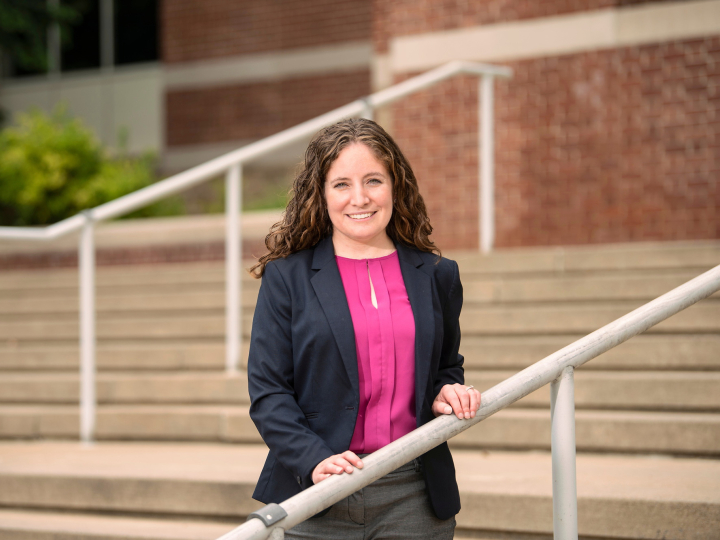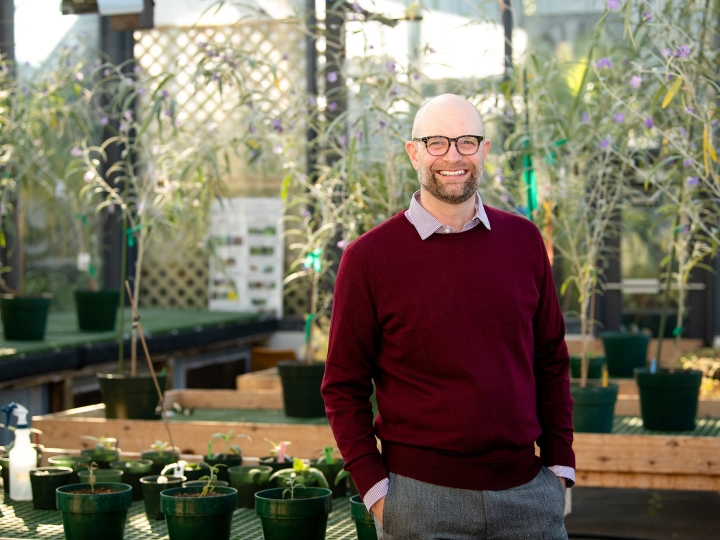For Undergraduate Researchers, It’s All About the Journey
August 10, 2017
The path leading Autumn Patterson '19 to this year's Susquehanna Valley Undergraduate Research Symposium started the day she set foot on the Bucknell University campus. The twists and bends her journey of discovery has taken since then have helped Patterson's communication, critical thinking and organizational skills grow "exponentially," she said, so her symposium presentation wasn't an end in itself, but another stop on that journey.
Patterson was one of 35 Bucknell students participating in the annual event (held Aug. 2 at nearby Bloomsburg University), where undergraduates from Bucknell, Bloomsburg and Susquehanna universities and interns with the Geisinger Health System show off the projects they've poured their undivided attention into all summer long. The symposium is organized by the participating institutions and the Bucknell Institute for Public Policy.
Patterson entered Bucknell as a presidential fellow, the recipient of a selective scholarship enabling her to collaborate with a faculty member on a long-term research project starting her first semester on campus. She had begun her first research project "before I even started my classes, and never stopped," Patterson said.
She thought at that time that she was following a track toward medical school, but through the mentorship of Professor Janet Knoedler, economics, she uncovered a passion for math and markets that led her to her major in mathematical economics. A first-year foundation seminar likewise revealed an interest in the changing shape of higher education in America, and a desire to learn more about the interaction of these newfound passions was born. The project she presented at the symposium is one outcome of that aspiration: an analysis of economic mobility in the United States viewed through the lens of higher education, which Patterson pursued with research partner Emily Tevebaugh '19.
Patterson was only one of dozens of Bucknell students who devoted their summer to research, and hundreds more who will pursue independent projects throughout the academic year. Through initiatives such as the Program for Undergraduate Research, Public Policy Research Fellowships and assistance from academic departments and external partners, students are provided summer housing and a modest stipend to support themselves as they explore the subjects that interest them most. The opportunity for undergraduates to pursue such personally meaningful research in close collaboration with faculty is one of the hallmarks of a Bucknell education, and an experience that many Bucknellians, like Patterson, find transformative.
"There is a huge shift in your mindset as a student when you go from reading publications about the forefront of science to being the one pushing that forefront forward, using what you have learned to make a difference in future students to come," said Olivia Langa '18, a biology and theatre major who spent her summer working at the Geisinger-Bucknell Autism & Developmental Medicine Center in Lewisburg, a nationally recognized clinical research institute staffed by physicians, researchers and student interns from both institutions. Langa used eye-tracking technology to study visual attention and presented her findings at the symposium.
Award-winning work
Now in its seventh year, the symposium provides participants with valuable presentational experience to complement the knowledge and skills they build by doing research. Four students are chosen to discuss their work during the symposium's closing award ceremony. This year, Langa was selected to present her project from among entries in the social science and humanities category. Dante Fresse '18 was awarded best poster in the same category for his historical research project, which spans two continents. During a research expedition to France and Belgium this spring led by Professor David Del Testa, history, Fresse shot video for a digital documentary chronicling the lives and experiences of the Bucknellians who served during World War I. || Read more about the expedition and Fresse's project.
Awards were also conferred in the biological science, natural science and engineering, and clinical and translational categories, though participants noted that just doing research offers its own rewards.
In order to advance his summer research project, for example, computer science & engineering major David Schwartz '19 learned two programming languages and a simulation software program, and made valuable connections with researchers at other universities. The process did not come without its frustrations, but pushing through challenges has helped him grow both in knowledge and character, he noted.
"Research is learning through failure, and professors do not hold your hand through the process," Schwartz said. "I've always received answers to questions I have asked, but in the end was left to develop my own solution. That isn't bad, though. It has taught me to be independent. I can now look at and overcome challenges on my own. My first attempts may fail, but by the end I will have gained an incredible amount of knowledge for each hurdle I overcome."
Assumpta Ishimwe Gasana '20, a civil engineering major from Rwanda, described even more personal reasons to value her summer research. She said her project, which examines the resiliency of transportation infrastructure, confronts an issue her country faces in its journey of development.
"I have been always eager to participate in my country's development, but until now, I didn't know how to help," she said. "There are a lot of opportunities at Bucknell to help you realize your dreams. All you have to do is to have dreams, voice them and show your interest."

